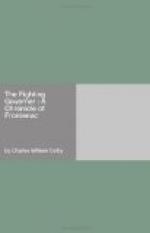Frontenac saw the matter differently and was unwilling to be deposed. Royal letters, which he produced, had styled him ‘President of the Council,’ and on the face of it Duchesneau’s commission only indicated that he should preside in Frontenac’s absence. With these arguments the governor stood his ground. Then followed the representations of both parties to the king, each taxing the other with misdemeanours both political and personal. During the long period which must elapse before a reply could be received, the Sovereign Council was turned into an academy of invective. Besides governor, bishop, and intendant, there were seven members who were called upon to take sides in the contest. No one could remain neutral even if he had the desire. In voting power Laval and Duchesneau had rather the best of it, but Frontenac when pressed could fall back on physical force; as he once did by banishing three of the councillors—Villeray, Tilly, and Auteuil—from Quebec (July 4, 1679).
Incredible as it may seem, this issue regarding the right to preside was not settled until the work of the Council had been disturbed by it for five years. What is still more incredible, it was settled by compromise. The king’s final ruling was that the minutes of each meeting should register the presence of governor and intendant without saying which had presided. Throughout the controversy Colbert remonstrated with both Frontenac and Duchesneau for their turbulence and unwillingness to work together. Duchesneau is told that he must not presume to think himself the equal of the governor. Frontenac is told that the intendant has very important functions and must not be prevented from discharging them. The whole episode shows how completely the French colonial system broke down in its attempt to act through two officials, each of whom was designed to be a check upon the other.
Wholly alienated by this dispute, Frontenac and Duchesneau soon found that they could quarrel over anything and everything. Thus Duchesneau became a consistent supporter of Laval and the Jesuits, while Frontenac retaliated by calling him their tool. The brandy question, which was partly ecclesiastical and partly civil, proved an excellent battle-ground for the three great men of Canada; and, as finance was concerned,




